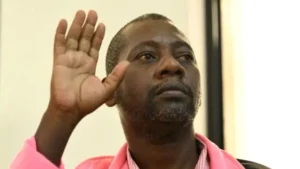NAIROBI — Former Chief Justice David Maraga has accused the Kenyan government of violating the Constitution by transferring billions collected from the electronic travel authorisation (eTA) programme to Swiss bank accounts.
In a sharply critical statement on Tuesday morning, Maraga said the move was yet another sign of what he called “unchecked impunity” in the handling of public funds.
“This is yet another flagrant violation of the Constitution,” he said. “All money collected by or on behalf of the government must be deposited in the Consolidated Fund. That is the law.”
The funds, collected through the eTA system introduced to streamline visitor entry into Kenya, were reportedly wired to a Swiss account during the programme’s initial rollout. The government has confirmed the transfers, calling them part of a pilot phase.
A Cloud of Doubt
Maraga, who served as Chief Justice from 2016 to 2021, questioned why such a significant financial move was made without Parliament’s knowledge or approval.
“When did Parliament approve this pilot? Why were the funds held in Swiss accounts known for their secrecy? Who signed off on this?” he asked.
He demanded full disclosure of the identities of those who had access to the offshore accounts and whether the money has since been returned to the government’s main account.
“What proof do we have that this isn’t another offshore scam? The people deserve answers.”
Government Responds
The backlash follows comments by Government Spokesperson Isaac Mwaura on Monday, who attempted to calm the storm. He explained that the transaction was part of a trial partnership between Kenya and a Swiss firm to develop the eTA platform.
“There was a piloting phase for the eTA programme,” Mwaura said in a press briefing. “It was done in collaboration with a Swiss company, and the process has now moved on.”
Mwaura did not clarify who the signatories to the Swiss account were or how much money was involved.
Public Funds, Private Handling?
The eTA system, launched in early 2024, was intended to modernise Kenya’s visa process and improve national security. Visitors to Kenya are now required to pay an entry fee online before arrival.
But the revelation that revenue from the programme was handled outside Kenya’s formal financial systems has raised red flags among legal experts and civil society groups.
“It’s not just about legality—it’s about trust,” said Nduta Gichohi, a governance analyst with the Institute of Public Finance. “People already feel their taxes vanish without trace. Now they hear travel fees are also being sent abroad.”
History Repeats?
Kenya has long struggled with financial scandals involving offshore accounts, from the infamous Goldenberg affair in the 1990s to more recent procurement scandals.
Maraga warned that this latest incident risks deepening public cynicism and weakening accountability.
“The lack of transparency in public finance is a root cause of our economic hardship,” he said. “This burden is carried daily by ordinary Kenyans, not those in charge.”
He called for an overhaul of leadership and a recommitment to integrity in public service.
“We need a moral reset. Kenyans must demand accountability, not just at the ballot box, but every day.”
With the pressure mounting, the government now faces calls to table a full report in Parliament. Until then, questions will continue to swirl about how money meant to support public services found its way to a private bank account across the globe.
















